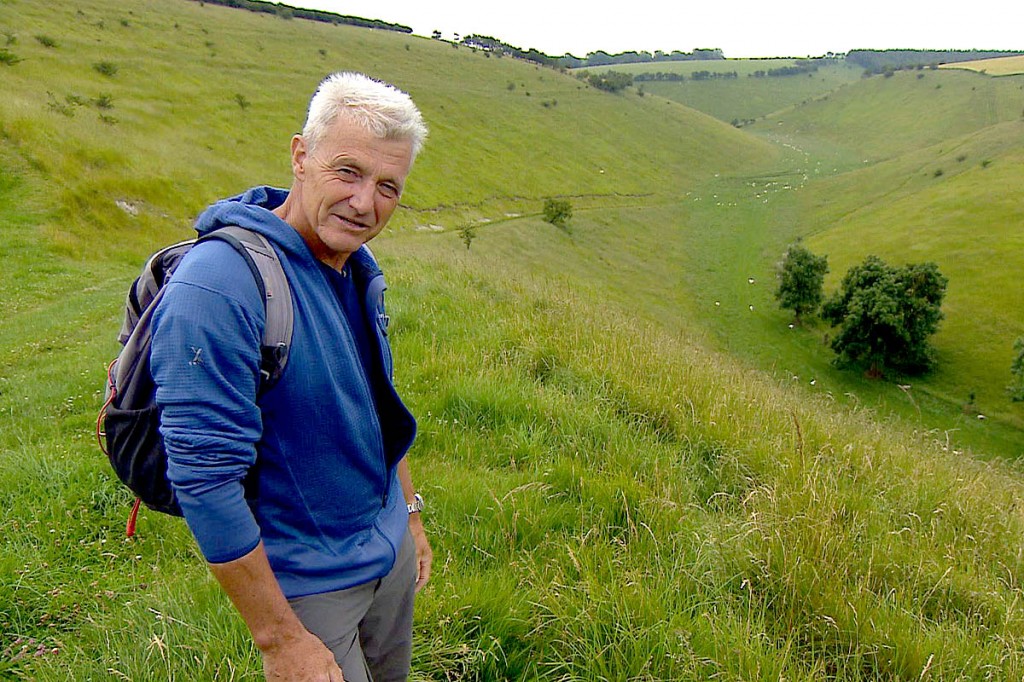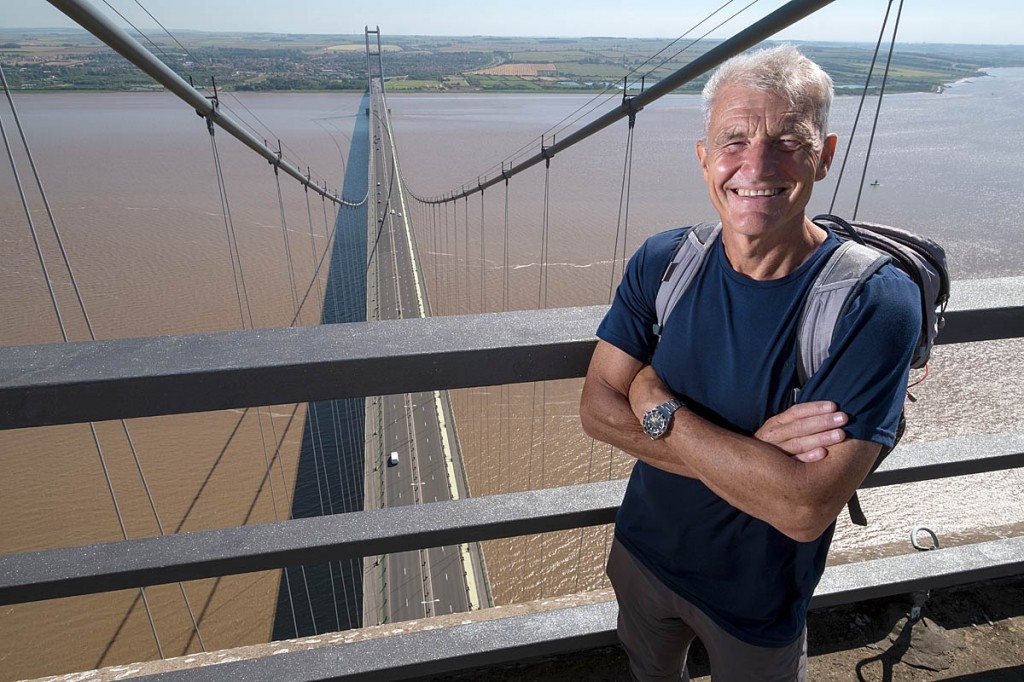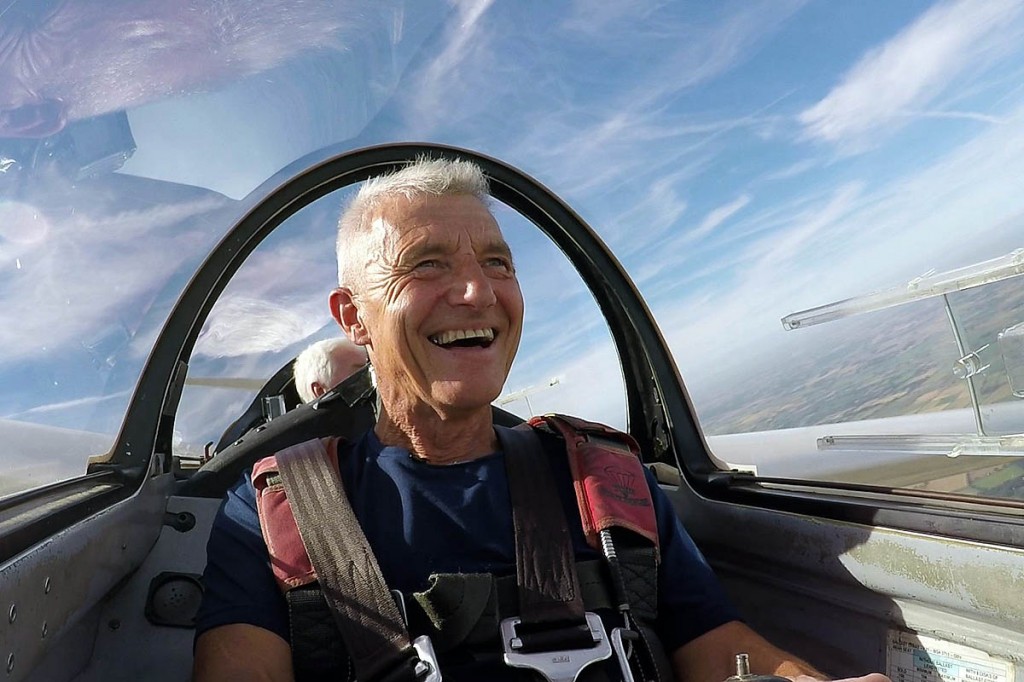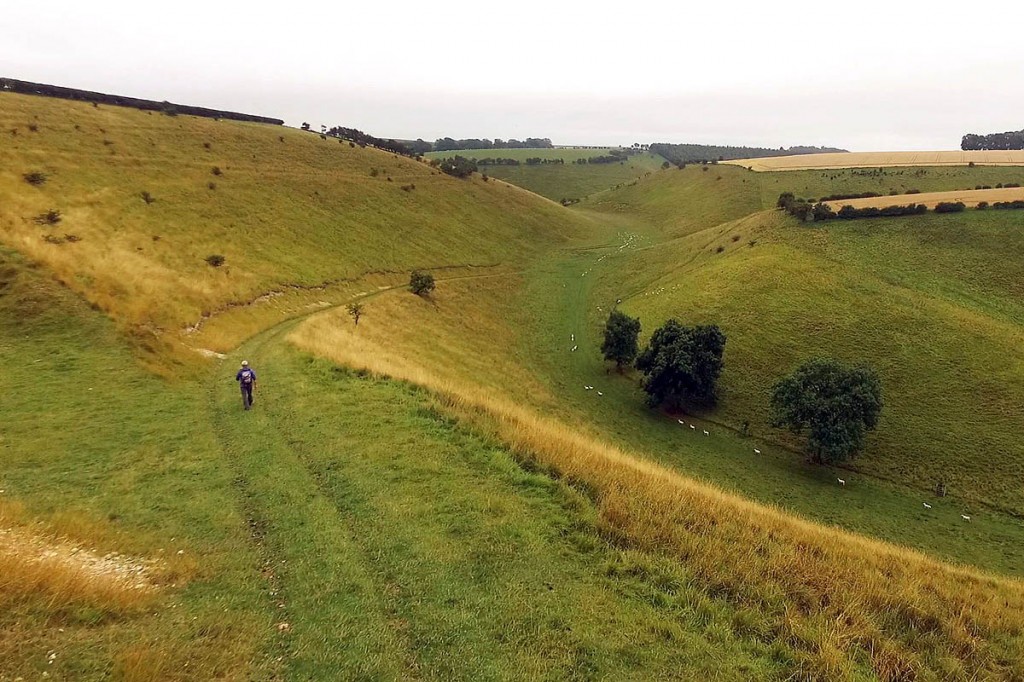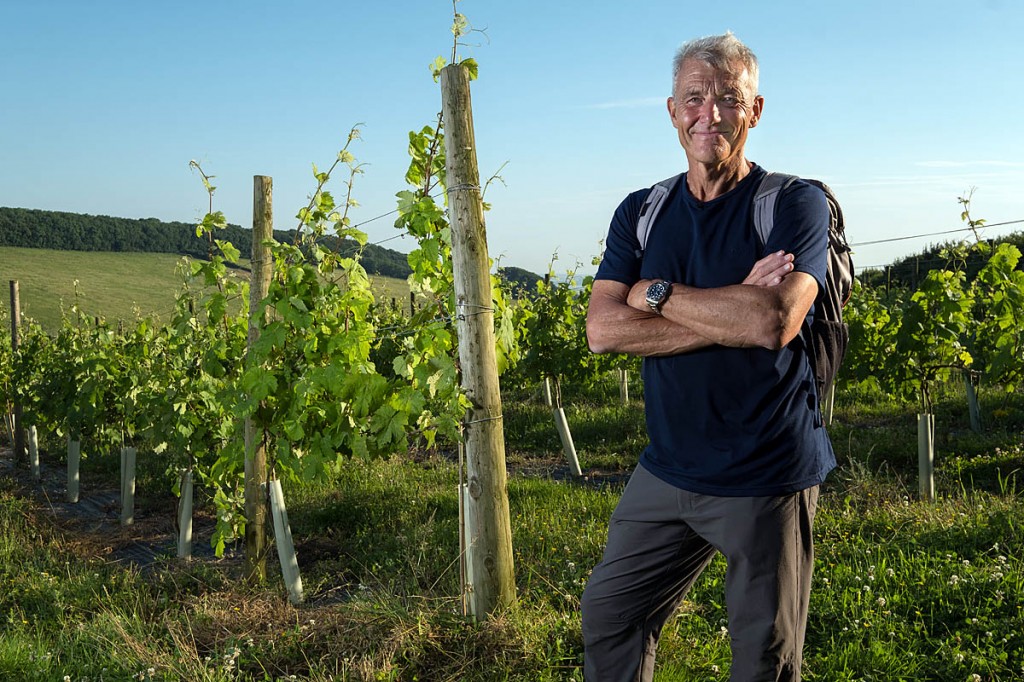He has been attacked by a polar bear; had an Antarctic peak named after him and spends much of his life diving below remote ocean waters, but adventurer Paul Rose has found himself hooked on a little visited walking route in northern England.
The Essex-born outdoorsman reveals the delights of the Yorkshire Wolds Way in two BBC programmes to be broadcast this month.
The two-part documentary follows his journey from the shore of the River Humber to Filey Brigg, the spit of land on the North Yorkshire coast that marks the end of this gentle national trail, which wends its way through chalk hills straddling that county and the East Riding of Yorkshire.
The 65-year-old has previously presented BBC programmes on the South West Coast Path – England’s longest national trail – and the Pennine Way. When director Paul Greenan contacted him with the idea of the Yorkshire Wolds programme, Rose said he thought: “Wolds Way; where the heck is that?’ I’ve been to Hull many times and I know the area but I couldn’t say I knew the Wolds Way. I did a fast bit of research and made a quick visit and immediately said yes, let’s do it.”
Speaking to grough, the presenter said: “It surprises everybody. It is a real treasure; one of Britain’s most beautiful and certainly one of the most overlooked walks.
“I spend most of my life hunting out the wild places in all the remote and challenges parts of the planet and for me to come on to a walk like that it was a joy. The sheer, easy beauty of it was a terrific surprise.
“I absolutely loved it; I’m completely hooked on the place.”
Rose has an ebullient, chatty manner and his enthusiasm for the area is obvious as he encounters the many attractions in the two programmes covering the 80-mile route.
From the top of the Humber Bridge to the nature reserve at Bempton Cliffs, he details some of the surprising sights en route: a GPS-guided tractor at work; a 4,000-year-old boat; the oldest horse race in the country; a nuclear bunker and the oldest radar station in the world.
He also tries his hand at riding a penny-farthing bicycle. Rose said: “I fell in love with riding a penny-farthing. I was terrified at first, but once I got the hang of it, I had a marvellous day and I got so excited I’ve gone and got two penny-farthings myself.
“I bought a copy. You can buy these modern copies with the same geometry and they look exactly the same as the old ones but they’re made from modern materials. Then Tony, who you see me ride with on the programme, I asked him to look out for a true vintage one and he found one a few weeks ago from 1887 so I bought it.
“The whole thing riding them is a bit of a commitment. You’ve got to commit jumping up on to that saddle that’s so high – about eye level – then when it comes to getting off it, you slow yourself down then you have to find that tiny step which is very low on the back of the frame. So the whole thing feels very committing all round – very funny.”
In the BBC programmes, he also takes to the air in a glider, enabling him to survey his whole route from above. “The Pocklington gliding was just amazing. The chance to be able to fly that beautiful aeroplane, a cross between a fighter jet and a live bird, it’s an amazing thing to be able to fly.
“Then you could see the whole of the Wolds Way – way down to the Humber Bridge, and I could look north and see Filey. What a wonderful way to experience that walk, to get up and learn to fly the thing myself.”
But it’s the gentle walking through the rolling countryside and the chance to wind down that captivated a man more used to pushing himself to the limit.
“Nearly all my friends are hooked on the great outdoors and big personal challenges, big career challenges and taking on big global issues all round the world, and sometimes it’s very hard to switch off and just relax outside.
“I often come back from big trips and find myself on a walk where I’m just thinking: ‘I wonder if I can get it done quicker than last time’, or ‘I wonder if I can join two of these great sections into one and be home early’ but the Wolds Way taught me something. People like me who are normally out there pushing the limit and driving themselves, it’s the great place to have a lesson in slowing everything down, and being in the present tense and just enjoying what’s going on around you, so for very experienced walkers, I would say it’s absolutely perfect.
“I’ve worked in places where people normally don’t go. I’m always in the polar regions, whether it’s the Arctic or Antarctic, where people either have never been or only two or three have been. I’m working in the deep sea on countless dives where I’m the first diver to see it and I live in the beautiful Lake District. So, I see a lot of natural beauty but there’s something very wonderful about the Wolds Way.
“It’s either the chalk that comes to the surface in those lovely fields; the wonderful wild flowers. A little bit of effort brings a lot of big rewards. I’m often working in the very big landscapes and the greater ranges in the world and that means you put a huge amount of effort for many days before anything actually happens.
“You’re walking and travelling and skiing for a long way before you realise the scenery is changing but on the Wolds Way, every short period of time you’re turning a corner and something great happens. It’s a really beautiful, beautiful place.”
The Yorkshire Wolds Way is a good prospect for less experienced walkers too, he believes. “It’s perfect for people who really don’t do much walking and are intrigued by it and can see the benefits of getting alongside nature in a suitable walk yet perhaps are a little uncertain about their navigation skills or their fitness or, if you’ve got new boots and you want to try them out, then I’d say the Wolds Way is ideal for those kind of things. So it really is a walk for everybody.
“It’s well waymarked; it’s a national trail so you can just pootle along and, dare I say it, you can probably even not take a map, though it is good to take a map because you can enjoy it a bit better. It’s marked really, really well.
“It is very quiet, and there lies a lot of the beauty. So I wonder if we’re going to be unpopular for making the walk popular because there will be a lot more people once they see the programme and realise just how great it is. Maybe I’m inadvertently giving up a beautiful secret.”
Even if it doesn’t prompt people to pull on their boots and hit the trail, Rose is happy to showcase a little corner of England that people may not be aware of. He said: “As well as encouraging people to get out there, if people realise we do have these national treasures that are right there; they are free; they are available; they are incredibly accessible for everybody, then I think that improves everybody’s lifestyle, even if someone has no intention of ever walking the Wolds Way or any of our other amazing national trails, if they know while they are watching television: oh, look at that, that’s in England, that is, that’s something we’re very proud of and it’s not far away from me. I believe, knowing that it exists improves everybody’s lifestyle.
“If you take it to the other extreme, if I told you Antarctica is a beautiful white wilderness that is reserved for science and is a very pristine area, that’s a very positive thing. You can imagine being in Antarctica, but if I said Antarctica’s now going to be used for storing hazardous waste, that would have a very negative impact on your life, even if you never go to Antarctica, so it’s something we should celebrate, that we’ve got these wonderful places and, of course, television’s a good way of doing it.”
For a man who has experienced some of the most extreme environments, the route through the Yorkshire Wolds provided a very different but satisfying change. “The first surprise was a very personal one,” he said. “I got a huge amount of satisfaction from slowing down, taking it easy, living in the present tense and just enjoying the moment, walking the Wolds Way; lying down next to those wild flowers. Smelling the flowers as you walk along is a terrific experience.
“It’s one of those walks that, no matter what the weather, you can still have fun. It’s not like some of the bigger walks in Britain where you’re very committed on some days and you have to have your navigation sorted out and you have to your timing and everything worked properly.
“With the Wolds Way, even on a wet day, you can just relax and enjoy the whole experience because the consequences of getting lost aren’t too severe.”
His CV includes some impressive expeditions with plenty of pinnacles and some close shaves. “I thought the career high point was getting Her Majesty the Queen’s Polar Medal. But then by surprise, I got this lovely letter from the Antarctic Place Names Committee, saying there’s a mountain named after me now. I’ve been back, but not to that mountain, so next time I go back I’m going to visit the mountain, Rose Bluff. It’s a beautiful rocky bluff with a wonderful snow-capped mountain on top, overlooking the Bellingshausen Sea on the Antarctic Peninsula.
“I was attacked by a polar bear the summer before last. I was up at Baffin Island working on a marine science project and had a polar bear jump on me but miss me in my tent while I was sleeping. I was just very lucky. These are whopping great predators; I was just a very lucky man.
“The only danger on the Wolds Way was that of eating too much in those lovely cafes on the way.
“The whole of it was a wonderful experience – rowing across the Humber in a traditional boat; getting on top of the Humber Bridge and learning from the engineers how it was built; meeting all the villagers and the people on the way was just a beautiful experience.”
The first of the two 30-minute documentaries The Yorkshire Wolds Way with Paul Rose will air at 7.30pm on BBC Two on Saturday 13 May, with the second due to be broadcast at 8pm on Saturday 20 May.
Rose said: “My dream is get the UK population knowing and understanding what we have and that way we can protect it. The busier we get, the more we need these places.
“Spring or early summer is the perfect time to broadcast something like this when people are beginning to think, the weather’s perfect, let’s get out.”
Paul Rose is planning another documentary with the BBC, but details are yet to be decided. In the meantime, his adventures continue. “I’m just back from an expedition to Tristan da Cunha, a marine science expedition and I’m now going back to another UK overseas territory, to Ascension Island, leading another marine science expedition for National Geographic.
“I think diving is my first love. Being alongside nature in powerful settings is what I like. I also dive here in Windermere where you can’t see much, just for the pleasure of being underwater.
“I climb and travel to all these wonderful glaciated peaks all over the region, particularly the polar regions, but I still love walking on the local hill very close to the house here, Brant Fell. The mixture is a good thing for me. One minute I’m diving in deep, cold water; the next I’m walking on a sunny hillside and I think it’s a good approach to have: to be close to nature in as many forms as possible.”
You can find out more about Paul Rose on his website. If you fancy tackling the Yorkshire Wolds Way, details are on the national trail site.
